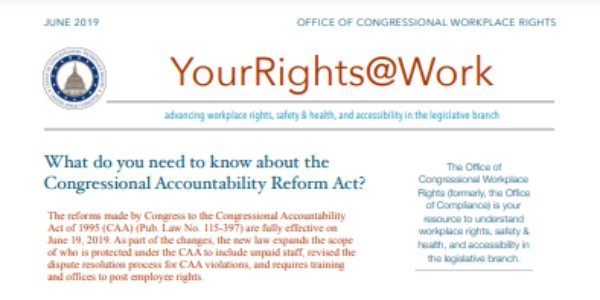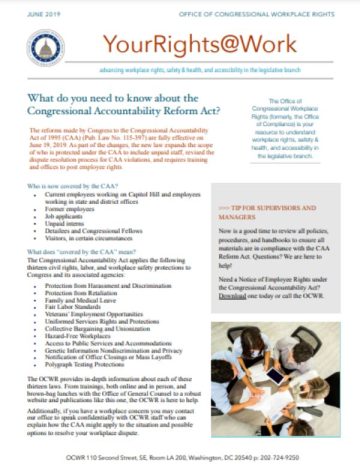The reforms made by Congress to the Congressional Accountability Act of 1995 (CAA) (Pub. Law No. 115-397) are fully effective on June 19, 2019. As part of the changes, the new law expands the scope of who is protected under the CAA to include unpaid staff, revised the dispute resolution process for CAA violations, and requires training and offices to post employee rights.
Who is now covered by the CAA?
- Current employees working on Capitol Hill and employees working in state and district offices
- Former employees
- Job applicants
- Unpaid interns
- Detailees and Congressional Fellows
- Visitors, in certain circumstances
What does “covered by the CAA” mean?
The Congressional Accountability Act applies the following thirteen civil rights, labor, and workplace safety protections to Congress and its associated agencies:
- Protection from Harassment and Discrimination
- Protection from Retaliation
- Family and Medical Leave
- Fair Labor Standards
- Veterans’ Employment Opportunities
- Uniformed Services Rights and Protections
- Collective Bargaining and Unionization
- Hazard-Free Workplaces
- Access to Public Services and Accommodations
- Genetic Information Nondiscrimination and Privacy
- Notification of Office Closings or Mass Layoffs
- Polygraph Testing Protections
The OCWR provides in-depth information about each of these thirteen laws. From trainings, both online and in person, and brown-bag lunches with the Office of General Counsel to a robust website and publications like this one, the OCWR is here to help.
Additionally, if you have a workplace concern you may contact our office to speak confidentially with OCWR staff who can explain how the CAA might apply to the situation and possible options to resolve your workplace dispute.
Who does the CAA apply to?
- U.S. House of Representatives (DC & district office staff)
- U.S. Senate (DC & state office staff)
- Office of Congressional Accessibility Services
- U.S. Capitol Police • Congressional Budget Office
- Office of the Architect of the Capitol
- Office of the Attending Physician
- Office of Congressional Workplace Rights
- The Library of Congress (except for Section 1351)
- Office of Technology Assessment • John C. Stennis Center for Public Service Training and Development
- U.S.-China Economic and Security Review Commission;
- Congressional-Executive China Commission;
- Commission on Security and Cooperation in Europe (Helsinki Commission) How has the administrati

